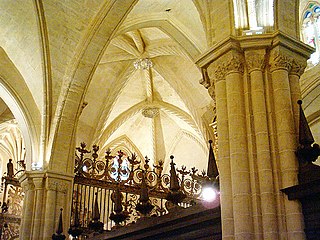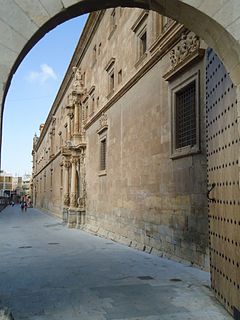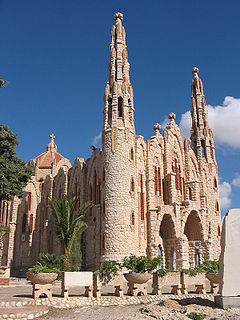
Alicante is a province of eastern Spain, in the southern part of the Valencian Community. It is the second most populated Valencian province. Likewise, the second and third biggest cities in the Valencian Community are located in this province.

Orihuela is a city and municipality located at the feet of the Sierra de Orihuela mountains in the province of Alicante, Spain. The city of Orihuela had a population of 33,943 inhabitants at the beginning of 2013. The municipality has a total area of 367.19 km², and stretches all the way down to the Mediterranean coast, west of Torrevieja, and had a total population of 92,000 inhabitants at the beginning of 2013. This includes not only the city of Orihuela, but also the coastal tourist development hub of Dehesa de Campoamor with 33,277 inhabitants (2013) and a few other villages.

Balayan, officially the Municipality of Balayan, is a 1st class municipality in the province of Batangas, Philippines. According to the 2015 census, it has a population of 90,699 people.

The University of Alicante was established in 1979 on the basis of the Center for University Studies (CEU), which was founded in 1968. The University main campus is located in San Vicente del Raspeig/Sant Vicent del Raspeig, bordering the city of Alicante to the north. As of 2011/12 academic year, there are approximately 27,500 students studying there.

Colegio de la Inmaculada is a Catholic school for primary and secondary education run by the Jesuits in Gijón, Spain since 1890.

The Diocese of Orihuela-Alicante is a Roman Catholic ecclesiastical territory located in the cities of Orihuela and Alicante in the Ecclesiastical province of Valencia in Spain. It was established as Diocese of Orihuela from the Diocese of Cartagena in 1564, obtaining its current denomination in 1959.
The 2008–09 Copa del Rey was the 107th staging of the Copa del Rey. The competition started on 23 August 2008 and concluded on 13 May 2009 with the final, held at the Mestalla Stadium in Valencia, in which Barcelona lifted the trophy for the 25th time in their history with a 4–1 victory over Athletic Bilbao, who qualified for the third qualifying round of the 2009–10 UEFA Europa League. The defending cup holders were Valencia, but they were eliminated in the quarter-finals.
The Colegio Cristo Rey is a Jesuit elementary and secondary school located in the city of Asunción, Paraguay. It was founded in 1938.

Colegio de la Inmaculada is a Catholic school for primary and secondary education run by the Jesuits in Lima, Peru, since 1878. It finds its roots in a school called Real Colegio de San Martin which was founded by the Society of Jesus in 1582.
Angelino Fons Fernández, was a Spanish film director and screenwriter. He is best known for his critically praised debut film La busca (1966). His career was closely linked to literature, adapting classic Spanish novels to the big screen.

The Valencian Community is an autonomous community of Spain. It is the fourth most populous autonomous community after Andalusia, Catalonia and Madrid with more than five million inhabitants. Its homonymous capital Valencia is the third largest city and metropolitan area in Spain. It is located along the Mediterranean coast on the east side of the Iberian peninsula. It borders with Catalonia to the north, Aragon and Castilla–La Mancha to the west, and Murcia to the south. The Valencian Community consists of three provinces which are Castellón, Valencia and Alicante.

Ramón Frade de León was a Puerto Rican visual artist and architect. His realist style of painting captured the life of the typical Puerto Rican in the twentieth century.

Cercanías Murcia/Alicante is a commuter rail service (cercanías) in the provinces of Alicante and Murcia. The line connects Alicante and Murcia with San Vicente del Raspeig, Elche, Orihuela, Totana, Lorca, and Águilas. It runs through 200 km of railways with a total of 26 stations.
Bernardo de Legarda was one of the most important artists of the Quito School movement.

The Co-cathedral of Saint Nicholas of Bari is a Roman Catholic co-cathedral located in Alacant, in the Valencian Community of Spain. The church, part of the Diocese of Orihuela-Alicante is dedicated to Saint Nicholas and was elevated to the title of cathedral on 9 March 1959 by Pope John XXIII.
Paco Cano Lorenza, also known as Canito, was a Spanish photojournalist from Valencia, who specialized in torero photography.

The University of Orihuela was located at the Convent of Santo Domingo, in Orihuela. It was the second university in the ancient Kingdom of Valencia, founded 40 years after the University of Valencia. The official name of the institution was Pontificia y Real Universidad de Orihuela. The aforementioned university was governed by the Order of the Preachers (Dominicans) who had their convent inside it.

Valencian Gothic is an architectural style. It occurred under the Kingdom of Valencia between the 13th and 15th centuries, which places it at the end of the European Gothic period and at the beginning of the Renaissance. The term "Valencian Gothic" is confined to the Kingdom of Valencia and its area of influence, which has its own characteristics.

Valencian Art Nouveau, is the historiographic denomination given to an art and literature movement associated with the Art Nouveau in the Valencian Community, in Spain.
Pedro Herrero Rubio was a Spanish Roman Catholic pediatrician. Herrero studied in Madrid and later in both Paris and Brussels before he began his profession in pediatrics in his hometown of Alicante where he served his entire life. He was arrested during the Spanish Civil War but released not long after his arrest after the Alicante populace demanded his release. He dedicated himself to aiding the poor and would often visit poorer neighborhoods in order to tend to children. His services as a doctor earned him several accolades in his later life including an appointment to the town's civic council.















